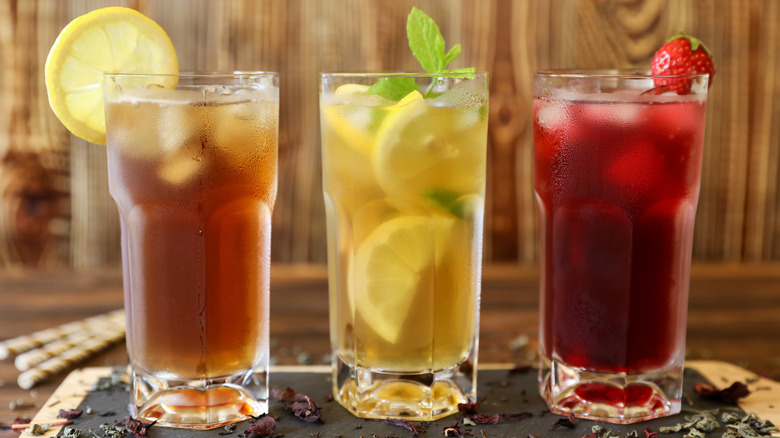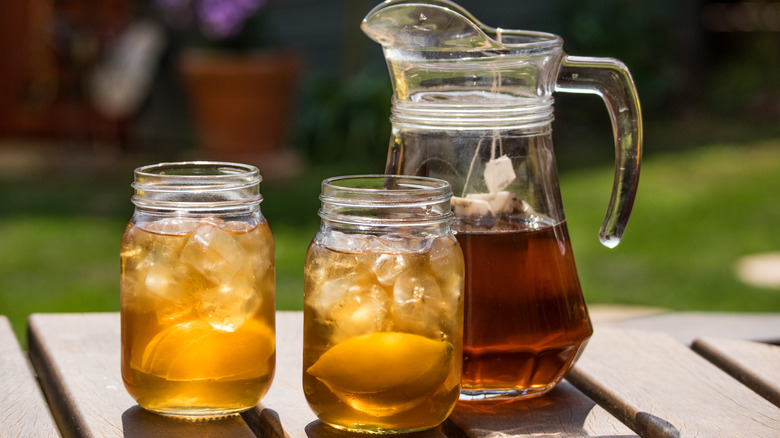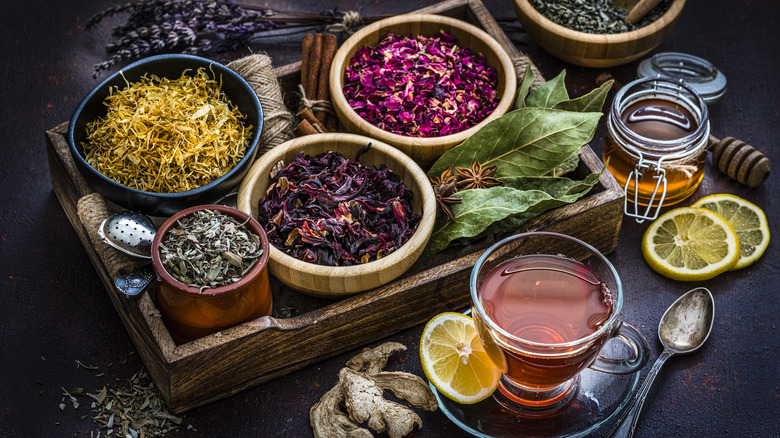The Best And Worst Type Of Tea For Boosting Hydration
Whether it's sweltering outside, you just hit the gym, or you are one of those people that always has an insulated cup in hand, hydration is important. While there is nothing wrong with good old-fashioned water, sometimes the taste gets a little tiresome and something a little more flavorful might be what you are after.
Tea is a great alternative to water because — with the exception of any added sugar or fruit — it is almost entirely water. Tea is full of flavonoids, an antioxidant that has been shown to increase heart health and may even reduce the risk of cancer. Depending on the type of tea, there are likely benefits to the lungs, brain, cholesterol levels, and blood pressure. But did you know that some teas actually dehydrate you? Any kind of non-caffeinated tea is great for boosting hydration, but caffeinated teas should generally be avoided.
That is because caffeine is a diuretic – it makes you go — so a lot of the liquid you are consuming just flows right on through. In beverages with a low amount of caffeine, the benefit of consuming the liquid generally overrides any loss from the caffeine. However, if you are not accustomed to caffeine or drinking a highly caffeinated tea, the dehydrating effect of the caffeine will likely be felt.
What's the worst type of tea for your hydration?
Caffeine and sugar are enemies of hydration, so something like a Southern-style sweet black tea is your worst bet. Black tea has a high level of caffeine, and as the name suggests, sweet tea is loaded with sugar. Beverages with a high sugar content can also have a diuretic effect. Drinking sweet tea is more akin to drinking a soda, which is fine once in a while, but not the best choice if you're looking for hydration.
Along with black tea, green tea and matcha have the highest caffeine levels, but white tea and oolong tea have caffeine as well. If you're a big fan of caffeinated teas and still want to keep hydration in mind, you can try cutting your favorite caffeinated tea with decaf tea, coconut water, fruit juice, or even milk to lessen the amount of caffeine you are consuming at once; just keep an eye on added sugar.
Caffeine-free teas are the way to go
Caffeine-free teas can include various fresh or dried herbs, spices, roots, and fruits. You can buy individual dried ingredients from bulk sections or specialty markets, or pre-packaged herbal tea blends. Just double-check the label, as it's common to combine caffeine-free ingredients with caffeinated teas, like in mango black tea or jasmine green tea.
The produce section is full of decaffeinated tea options — citrus fruits, ginger root, herbs like basil, mint, and rosemary, and even berries and tropical fruits. Fresh or dried flowers like lavender, chamomile, rose, echinacea, hibiscus, and jasmine work well too. Your spice cabinet is full of potential, especially from aromatic spices like cinnamon, bay leaves, cloves, and star anise. Check out rooibos tea, which comes from the fermented leaves of a shrub native to South Africa. It is naturally caffeine free and acts as a great substitute for black tea. Simply steep your ingredients of choice in hot water, strain, and drink hot or chill in the fridge. Enjoy this fun, flavorful, and hydrating option whenever you want to switch things up!



